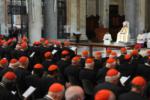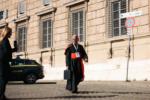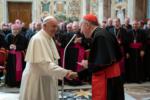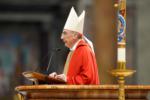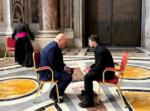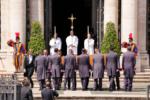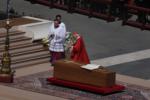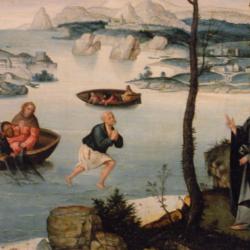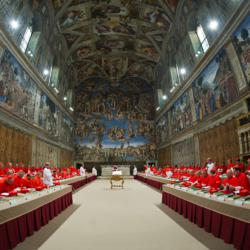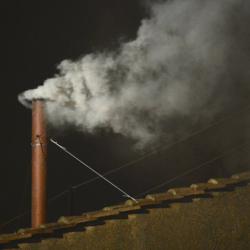Cardinal Parolin, top aide to Pope Francis, has key role in conclave
VATICAN CITY (CNS) -- Cardinal Pietro Parolin, Vatican secretary of state since early in the pontificate of Pope Francis, has long been near the top of pundits' lists of potential successors to the Argentine pope.
As secretary of state, the 70-year-old Italian diplomat has had a hand in coordinating every aspect of Vatican activity since taking on the role in October 2013 and is likely to be the cardinal elector who has had the most interaction with the other cardinals who will enter the Sistine Chapel May 7 for the conclave.
And, as the top-ranking cardinal bishop under the age of 80, he will administer the oath of secrecy to the other electors in the Sistine Chapel and, when a candidate receives more than two-thirds of the votes, it will be his responsibility to ask, "Do you accept your canonical election as Supreme Pontiff?" and "By what name do you wish to be called?"
Cardinal Parolin is multilingual and has represented Pope Francis and the Holy See on the world stage, including multiple times at the U.N. Security Council and taking an ailing pope's place at the U.N. climate summit in Dubai, United Arab Emirates, in 2023.
In April 2024, speaking at the presentation of a book, Cardinal Parolin said the reform projects launched by Pope Francis -- projects aimed not just at institutions, like the Roman Curia, but at attitudes and pastoral approaches -- will not be reversed, even though some may take different forms in the future.
Ongoing discernment, "which is not simply intuition but the fruit of continual prayer in the Spirit," will show the church "how to continue and what to make institutional," the cardinal had said. But "precisely because it is the action of the Spirit there can be no reversal."
At the time of his appointment to the top Curia post, he was the Vatican nuncio to Venezuela. He told reporters at the time he was surprised Pope Francis chose him to be secretary of state, a role that makes him the pope's chief aide.
"I see how he carries out his role with great joy, and I hope this joy, this simplicity of spirit will infect me," he said.
The secretary of state coordinates the work of the Roman Curia, coordinates the preparation and publication of papal documents, and supervises the work of Vatican nuncios in their relations with Catholic communities in individual countries and with national governments.
But if cardinals in the conclave are looking for a person with comprehensive pastoral experience, Cardinal Parolin might not be the right fit. He served as an assistant pastor in the Diocese of Vicenza, Italy, for only two years before being sent to Rome to study at the Pontifical Ecclesiastical Academy, the Vatican's diplomatic school, and entering the Vatican diplomatic corps.
Born Jan. 17, 1955, in Schiavon, Italy, he was ordained to the priesthood in 1980 for the Diocese of Vicenza. While studying at the diplomatic academy, he earned a degree in canon law from Rome's Pontifical Gregorian University. In 1986, he began working at Vatican embassies, serving in Nigeria and in Mexico before moving to the Vatican Secretariat of State. He was named undersecretary for foreign relations in 2002 and appointed nuncio to Venezuela in 2009.
In February 2014, he became the first cardinal created by Pope Francis. And, beginning in July 2014, was a member of Pope Francis' international Council of Cardinals, advising the pope first on the reorganization of the Roman Curia and then on a variety of issues of church life and governance.
In the area of Vatican diplomacy, Cardinal Parolin has been a key figure in and staunch defender of the Vatican's provisional agreement with China on the nomination of bishops. While the text has never been published, the agreement -- originally signed in 2018 and renewed every two years since then -- outlines procedures for ensuring Catholic bishops are elected by the Catholic community in China and approved by the pope before their ordinations and installations.
The agreement has been criticized as conceding too much control over the church to China's communist government and to the Catholic bishops it exercises control over.
When the agreement was signed, Cardinal Parolin recorded a video statement saying, "The objective of the Holy See is a pastoral one: the Holy See intends just to create the condition, or to help to create the condition, of a greater freedom, autonomy and organization, in order that the Catholic Church can dedicate itself to the mission of announcing the Gospel and also to contribute to the well-being and to the spiritual and material prosperity and harmony of the country, of every person and of the world as a whole."
Even when China appeared to violate the agreement, as it did in 2023 when it transferred a bishop without consulting the Vatican, Cardinal Parolin issued a public statement of "regret" but insisted the agreement was sound.
"It is inevitable for there to be problems, but if this dialogue grows in truth and mutual respect, it can be fruitful for the church and Chinese society," he told Vatican Media.
"Together we must prevent disharmonious situations that create disagreements and misunderstandings," including among Catholics, he said. Applying the agreement well "is one way to do that, together with sincere dialogue."

